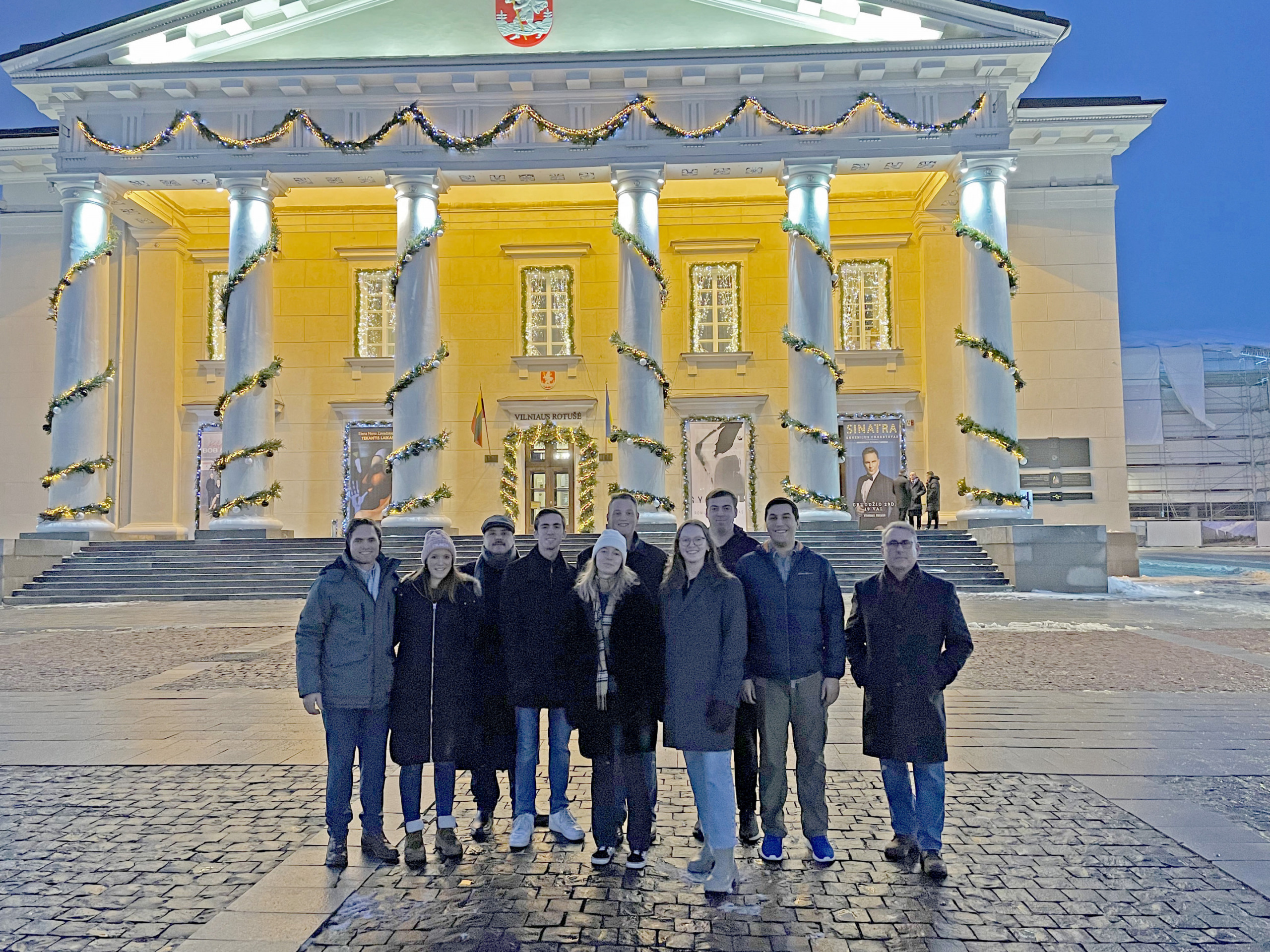Search News Archives
Filter News Articles
Additional Navigation
Liberty University sponsors trip to Lithuania as part of analytical support presentation to NATO
January 4, 2024 : By Bryson Gordon - Office of Communications & Public Engagement
Over Christmas break, nine Liberty University students, led by Helms School of Government Associate Professor Scott Roenicke, had the opportunity to experience international relations firsthand as they traveled to Lithuania to meet with U.S. diplomats and to present in front of NATO officials as a part of Liberty University’s Analytical Support Initiative (LASI).

LASI, Roenicke said, is an interdisciplinary group of LU students who were commissioned by a NATO Centre of Excellence to conduct an independent analysis integral to the security of the U.S. and the NATO Alliance. On the trip, the students had the opportunity to show their work and present their findings to a group of NATO officials, and to demonstrate the implications their analytical conclusions would have on Euro-Atlantic security.
The group of nine students left Lynchburg on Dec. 12, and packed many other experiences into their trip, including visits to historic churches and museums that chronicled the country’s recent history of occupation under Nazi Germany and the Soviet Union.
Additionally, the students stopped at the U.S. Embassy in the capital city of Vilnius, where they were greeted by Chargé d’affaires ad interim Tamir Waser, and met other embassy officials on the tour including Advisor to the Ministry of National Defense Marc Torosian, Chief of the Office of Defense Cooperation Steve Chu, and Chief of the Political and Economic Section Emily Hicks.

But it was the presentation with NATO officials that was the most fulfilling for Kinsey Painter, a member of the LASI team who is working on her master’s degree in psychology.
“It’s always been the best thing I could do in my academic career because it’s so fulfilling,” Painter said about working with LASI, specifically on this NATO initiative. “You get to work with people who actually care … and because you’re doing something that you’re interested in. I think it shows how it doesn’t take a job or a title to produce something worthwhile. You can do it wherever you’re at.”
Elise Hof, a senior studying government with a focus in national security studies, said the trip gave students a chance to “come face to face with our aspirations.”
“We are the ones being raised up and we continue to do this hard work with the blessing of the Lord so that one day we may have the opportunity to walk in their shoes,” Hof said of the interactions with senior government officials. “I think it’s just phenomenal to really get to see down the line of your career as a student.”
In front of NATO, Roenicke said the students presented “incredibly consequential” work, and even engaged the officials in debates and model exercises to explain the concepts of their studies. The senior officials in the room, he said, “really appreciated the work the students did and their multifunctional problem-solving approach.”

“I’ve heard from people in the intelligence community that when they are presented the results of cross-functional analyses, they are extremely impressed by the depth of detail and the complex frameworks that are used,” Roenicke said, who brings his own 30 years of experience as a Pentagon official who served as Senior Advisor for Russia Affairs to the Chairman of the Joint Chiefs of Staff and as Director for Russia Affairs at the White House.
Hof said the opportunity allowed all of the students in the group to walk away with a “sense of confidence” that their work was validated.
“We ran an exercise with them walking them through our tool, breaking down different contingency scenarios for NATO throughout their territories, and they immediately took to the exercise and utilized our product in their analysis, demonstrating how our framework can be used to drive decision making,” Hof said. “To see they were so invested in our group’s work, as students, that was a standout from the briefing for us.”
Roenicke said the officials from NATO valued the students’ work so much that they are open to continuing the relationship with LASI, something he said is “in large measure due to the competent analysis the students provided.”

“It significantly diverged from the typical student engagement,” he added. “The Centre of Excellence even wants our students to come to their NATO planning session. It is clear they were incredibly impressed by the student products and consequently, they desire to create an enduring relationship.”
Painter added that experiences like these, with professors as passionate as Roenicke, is a “concrete way of showing that our professors care about our education.”
“There are schools and departments where students don’t get these kinds of opportunities,” she said. “I think we’re all blessed to be a part of LASI and I’m thankful for the doors God has opened for the students who went with us and those that come after us.”


